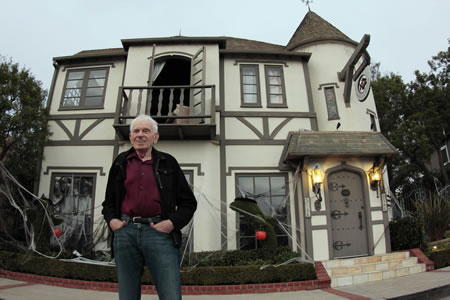
Noted author and Laguna resident Arnold Hano will receive the Baseball Reliquary’s Hilda Award this Friday in Pasadena in recognition of his contributions to a game that he helped define from a fan’s perspective in his critically acclaimed book “A Day in the Bleachers.”
Founded in 1996, the nonprofit Baseball Reliquary’s mission is to foster an appreciation for baseball history by honoring players, coaches, umpires, writers and others who have made a unique social, cultural or economic impact on the game.
“We are probably the only baseball organization in the country which receives its major grant funding through a public arts agency,” said founder Terry Cannon, referring to Reliquary’s main benefactor, the Los Angeles County Arts Commission.
To get to the Polo Grounds in the Bronx, where Hano grew up, “All I had to do is walk down Coogan’s Bluff,” he said, referring to the promontory that overlooked the long ago-razed baseball park where he spent many summers watching his beloved Giants.
When he was 4, Hano got his first taste of the national pastime from the Polo Grounds’ cheap seats, where he used to stuff his knickers with discarded soda bottles that he later redeemed to buy tickets to future games. At 8, he began writing for his brother’s home-grown mimeographed newspaper.
Hano’s two passions, writing and baseball, aligned one early fall afternoon in 1954 when the 32-year-old editor and freelance writer decided on a whim to see if he could get a ticket to the first game of the World Series between the Giants and the visiting Cleveland Indians.
He procured a $2.10 ticket. From his seat beyond the outfield wall, he soaked up everything around him, taking notes with both his mind and his pen. “I wrote in the gutter of the [N.Y.] Times,” he said.
Hano’s first thought was to turn his experience into a magazine article. “It didn’t work. It was wrong,” he said.
What many consider the quintessential baseball book written from a fan’s perspective, “A Day in the Bleachers,” published in 1955, chronicles that fateful September day when Willie Mays made his legendary over-the-shoulder catch in deep center, and the Giants won the first of four straight on a 10th-inning walk off homer by Dusty Rhodes.
The following year, a deepening recession prompted Hano’s employer to cut the editor’s pay. Hano decided to become a full-time freelancer and moved his family west, leaving his Giants behind. “If I’m going to starve, I’d rather starve on my own terms,” he thought at the time.
A few months later, the Hanos stumbled on a rural Laguna during a trip from Los Angeles to San Diego. “We liked the way it looked, and we stopped in,” he said.
Three years later, Sports Illustrated flew Hano back to New York to cover the final Giants game at the Polo Grounds. Hano recorded those final innings and outs in the home away from his boyhood home much the way he did that fall day in ’54, only this time it didn’t have a happy ending. The New York Giants were routed by the Pittsburg Pirates 9-1 that day. The following season they were in San Francisco.
“A Day in the Bleachers” has been in continuous print for more than half a century, yet Hano’s baseball opus has brought only modest commercial success to the veteran author. “It sells like cold cakes,” he said.
But that didn’t stop the Reliquary from honoring him with the 12th annual award, named for legendary Brooklyn Dodger fan Hilda Chester. “The Hilda was created to help remedy what our organization felt was the woeful underrepresentation of the paying customer in the game’s official history,” said Cannon.
Now 90, Hano’s failing eyesight keeps him away from the diamond these days. Instead of the bleachers, he watches the sport he loves from the comfort of his own living room, four feet from his 46” flat screen TV. What diehards of a long ago era used to live for, seeing a game in person, isn’t what it once was, according to Hano. “I think the fan is a dying breed.”
For Hano, the difference between the fans then and now is money. Legendary baseball owner Bill Veeck once said, “The knowledge of the game is usually in inverse proportion to the price of the seats.”
Higher ticket prices are purging the game of knowledgeable, die-hard fans in favor of spectators. “I consider a fan different than a spectator,” said Hano. “They go there to glimpse the game in between sipping their shiraz or whatever else they get in their corporate seats.”
With countless western novels, historical novels, magazine articles and newspaper columns to his credit, Hano isn’t quite sure why “A Day in the Bleachers” has garnered so much attention through the years. “I don’t think it’s a great book,” he said, but it “has a certain easy going elegance. Baseball is like that.”
Asked if he thought A Day in the Bleachers could be written today, Hano said, “It could be done, but I don’t know if anybody would care.”




